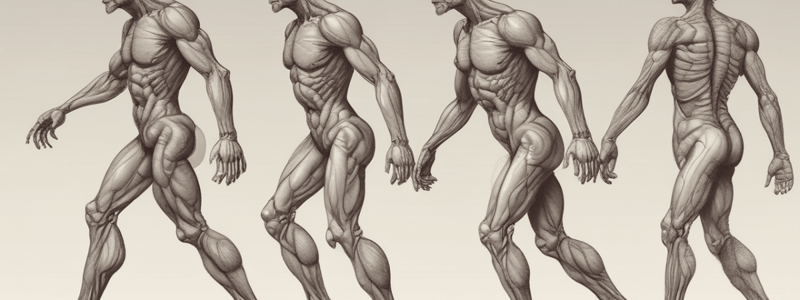Podcast
Questions and Answers
What is the process called when cells die as a normal part of development?
What is the process called when cells die as a normal part of development?
- Mitosis
- Cell regeneration
- Cell division
- Apoptosis (correct)
What is the estimated number of cells in the human body?
What is the estimated number of cells in the human body?
- 1015
- 1012
- 1013 (correct)
- 1014
What is the theory that states 'survival of the fittest'?
What is the theory that states 'survival of the fittest'?
- Genetic Drift Theory
- Evolution (correct)
- Cell Division Theory
- Cell Theory
What is the primary function of epithelial tissue?
What is the primary function of epithelial tissue?
What is the term for the basic units of life?
What is the term for the basic units of life?
What is the estimated number of cells in the human body?
What is the estimated number of cells in the human body?
How many cells die in each adult every day?
How many cells die in each adult every day?
What is the term for the complex organizational arrangements of cells to fulfill specific functions?
What is the term for the complex organizational arrangements of cells to fulfill specific functions?
What is the function of the rough endoplasmic reticulum?
What is the function of the rough endoplasmic reticulum?
What is the name of the organelle responsible for waste breakdown and disposal?
What is the name of the organelle responsible for waste breakdown and disposal?
What is the name of the organ system that includes the stomach?
What is the name of the organ system that includes the stomach?
What is the function of the Golgi Complex?
What is the function of the Golgi Complex?
What is the name of the organelle responsible for generating energy for the cell?
What is the name of the organelle responsible for generating energy for the cell?
What is the name of the structure that provides support and transport in the cell?
What is the name of the structure that provides support and transport in the cell?
What is the approximate mass of cells lost each year through normal cell death?
What is the approximate mass of cells lost each year through normal cell death?
What was the timeframe for the completion of the first human genome?
What was the timeframe for the completion of the first human genome?
What is a major barrier to learning biology?
What is a major barrier to learning biology?
What is the purpose of anatomical terminology?
What is the purpose of anatomical terminology?
What percentage of the gut surface area is increased by villi and microvilli?
What percentage of the gut surface area is increased by villi and microvilli?
What is the term for the balance between acid and base in the body?
What is the term for the balance between acid and base in the body?
What is the consequence of a potassium level above 7?
What is the consequence of a potassium level above 7?
What is the role of the kidneys in maintaining acid-base balance?
What is the role of the kidneys in maintaining acid-base balance?
Flashcards are hidden until you start studying
Study Notes
Organization and Complexity of the Human Body
- The human body is the most complex machine ever to have evolved, with approximately 37 trillion cells.
- There are two major concepts: evolution ("survival of the fittest") and cell theory (all organisms are made of cells, cells are the basic units of life, and cells come from pre-existing cells that have multiplied).
Cell Types and Organization
- There are two major classes of cells:
- Cells form tissues, which are complex organizational arrangements of cells to fulfill specific functions.
- There are five basic tissue types: epithelial, connective, muscle, nervous, and adipose tissue.
Organs and Organ Systems
- Organs contain different combinations of basic tissue types, for example, the stomach.
- The stomach is an organ of the digestive system.
- The human body is made up of organ systems.
Cells and Composition
- The human body is made up of cells and water.
- Around 37 trillion cells make up the human body.
- Programmed cell death, called apoptosis, is a normal part of development, with approximately 10^11 cells dying in each adult each day and being replaced by other cells.
The Genome
- The first human genome was completed in 1990-2003, taking 13 years and costing $5 billion.
- Proteomics and polygenic risk are related concepts.
Anatomy and Physiology
- A big barrier in learning biology is language, with anatomical terminology being important.
- The human body has a high degree of complexity, with various systems working together (e.g., energy supply, scaffold, propulsion system, pumps, ventilation, plumbing, purification plant, protection, and control systems).
Control and Regulation
- The human body has a tightly controlled system, with variations in glucose levels leading to diabetes, albumin levels leading to renal disease, and electrolytes/CO2 levels leading to cardiovascular disease.
- Balancing acid and base levels is crucial, with respiratory, metabolic, and renal systems playing a role.
Surface Area and Volume
- The human body has a high surface area to volume ratio, with the lung alveoli, gut villi, and kidney microvilli increasing surface area.
- This is important for functions such as gas exchange, nutrient absorption, and waste removal.
Bioengineering and Technology
- Bioengineering is the application of engineering principles to develop innovative solutions for medical and biological systems.
- Examples of bioengineering include exoskeletons, bionic ears, and artificial hearts and kidneys.
Cell Structure and Function
- Cells are like factories, with a control centre (nucleus), protein synthesis and sorting (endoplasmic reticulum and Golgi complex), power generation (mitochondria), waste disposal (lysosomes), and transportation systems (cytoskeleton).
- Cells can grow and function independently, with many different types fulfilling various functions.
Studying That Suits You
Use AI to generate personalized quizzes and flashcards to suit your learning preferences.



